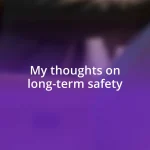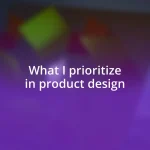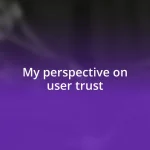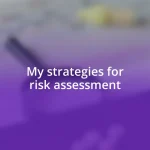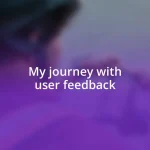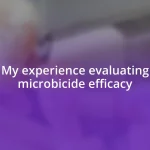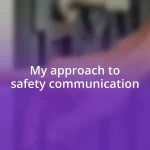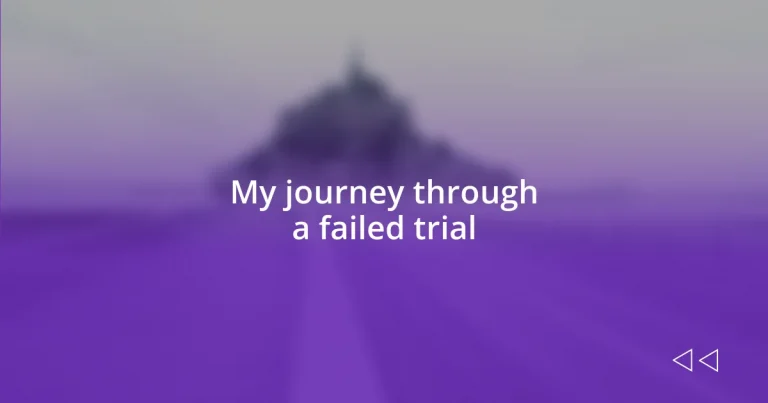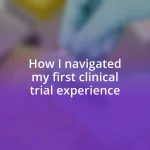Key takeaways:
- Embracing failure provides valuable lessons, fostering resilience and personal growth.
- Effective communication and community support are essential for navigating the emotional challenges during clinical trials.
- Sharing insights and experiences with others cultivates empathy, transforming individual struggles into collective empowerment.
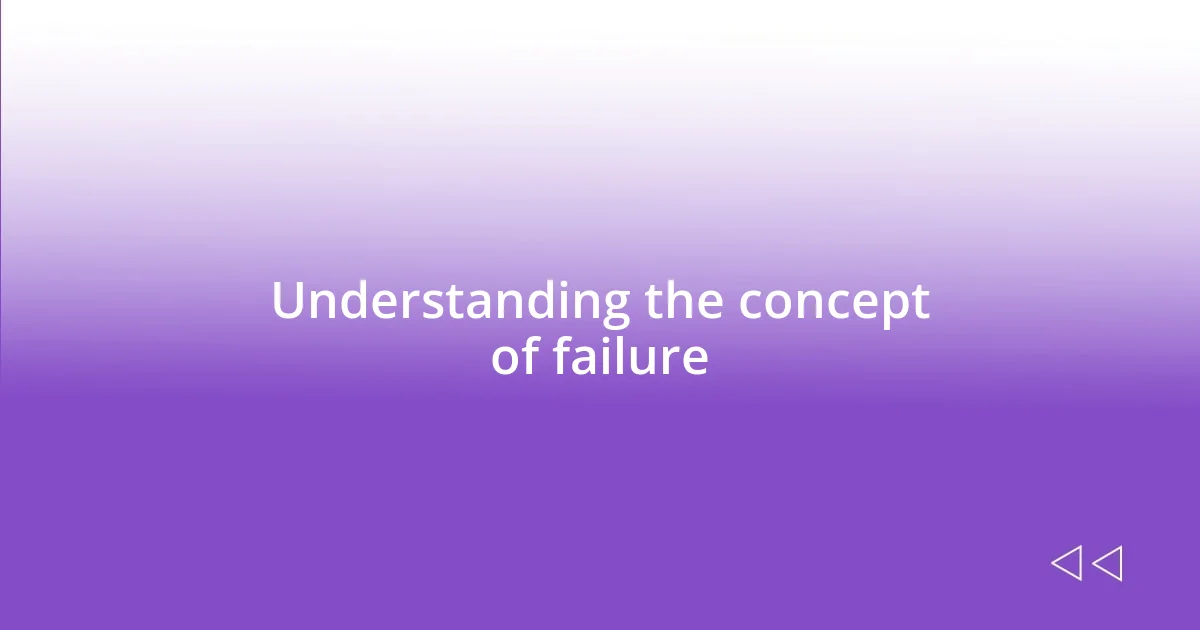
Understanding the concept of failure
Failure is often viewed as a negative outcome, but I see it as a crucial stepping stone on the path to success. I remember a time when I invested so much effort into a project, only to see it flop spectacularly. In that moment, I felt a wave of disappointment wash over me, but it also ignited a determination to learn and improve.
Think about it: isn’t failure just a sign that we’re pushing boundaries? When I faced setbacks, the emotions were intense, like the sting of a missed opportunity. However, those moments forced me to reflect on my approach and adapt. It was through this reflection that I discovered the valuable lessons hidden within failure, ultimately shaping my understanding of what success really means.
Each failure is like a mirror, reflecting not just what went wrong, but also highlighting my resilience and willingness to grow. I often ask myself—what can I gain from this experience? Embracing failure helped me develop a deeper understanding of perseverance, turning what once felt like a dead end into a vibrant path forward.
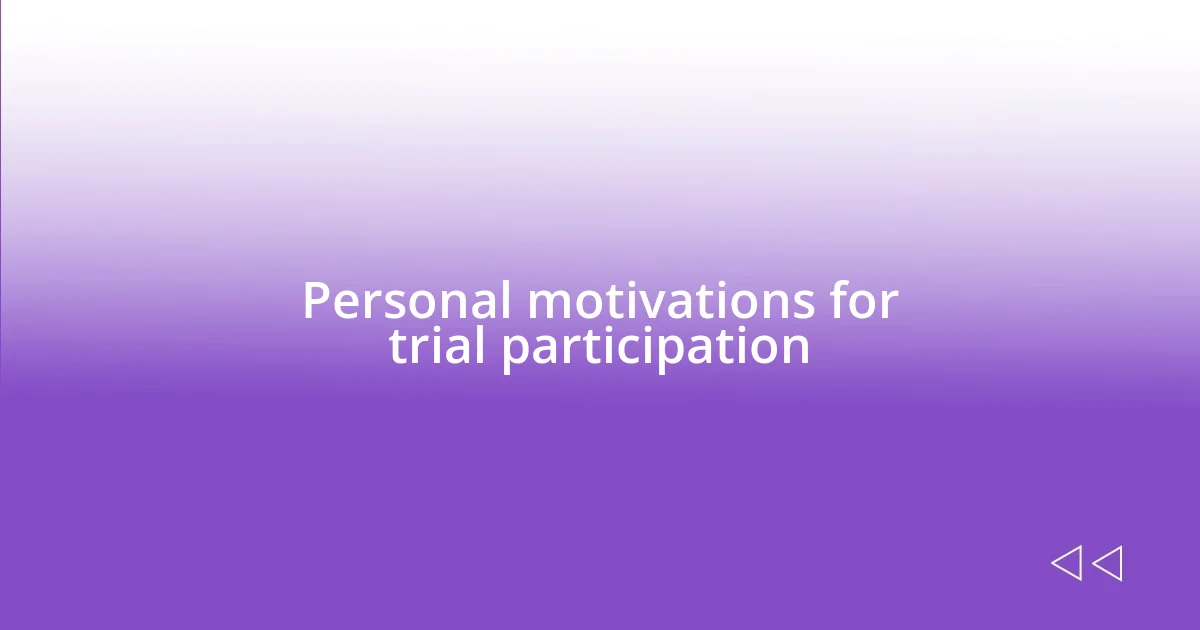
Personal motivations for trial participation
Participating in a trial can be a deeply personal decision, driven by numerous motivations that resonate with individuals on various levels. For me, the desire to contribute to something larger than myself was a major factor. I remember sitting in a clinical waiting room, feeling the weight of the world around me, thinking about how my involvement could potentially pave the way for breakthroughs that might change lives. It felt empowering to know that my experience, my body, could provide critical data in the quest for better treatments.
Some of the motivations that fuel trial participation include:
- Hope for Innovation: Belief that participating could lead to advancements in medical treatments.
- Personal Benefit: The possibility of receiving cutting-edge therapies not yet available to the public.
- Sense of Community: Desire to connect with others facing similar health challenges.
- Contribution to Science: Motivation to aid researchers in understanding a disease better.
- Empowerment: Taking an active role in one’s own health journey rather than feeling sidelined.
I often find that these motivations intertwine with my personal experiences, shaping my outlook and purpose in ways I never anticipated. Each reason feels like another thread woven into the larger tapestry of my journey, creating a narrative that is uniquely my own.
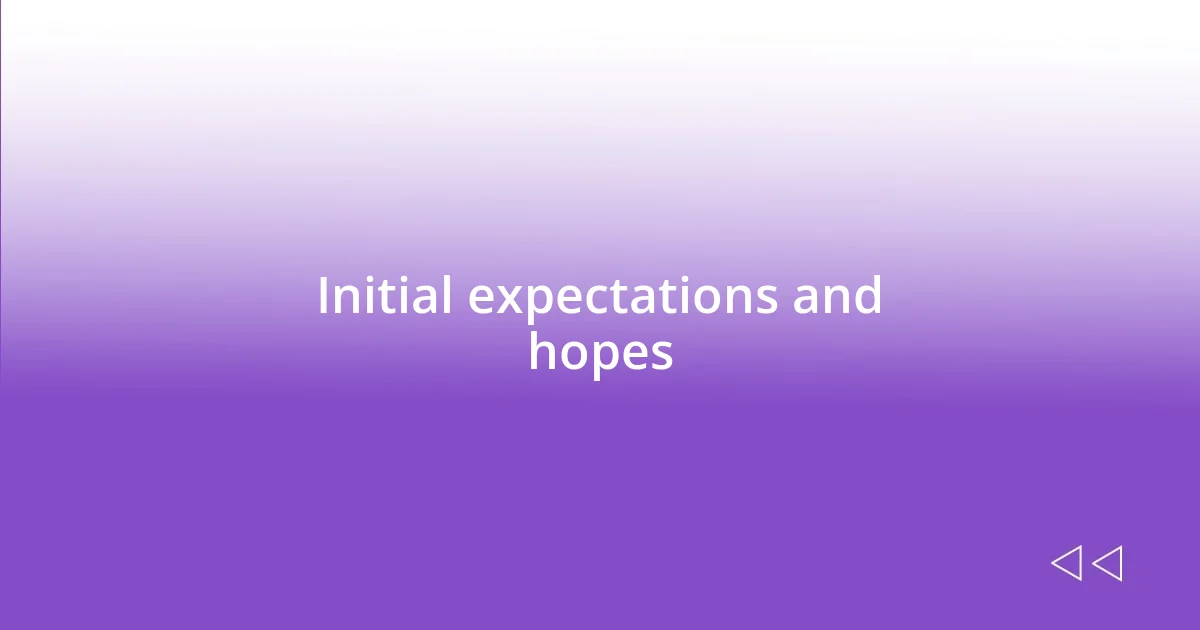
Initial expectations and hopes
When I first considered participating in the trial, my expectations soared. I envisioned myself as part of a groundbreaking study, filled with optimism about the potential outcomes. I remember thinking that maybe, just maybe, my contribution would lead to new therapies that could save lives. The hope was palpable; I was ready to make a difference.
As I navigated the early stages of the trial, my initial excitement often felt like a warm glow, guiding me through the process. I had imagined about being surrounded by supportive professionals, all working toward the same goal. In my mind, this was more than just a clinical setting; it was a community dedicated to progress. The thrill of hope kept me motivated, igniting the belief that I could be part of something much bigger.
Yet, there was a nagging uncertainty that danced at the edges of my mind. Despite the highs of my initial hopes, I wondered if I could handle the potential challenges ahead. Could I remain resilient in the face of setbacks? This inner dialogue was significant for me. It pushed me to consider not only my aspirations but also how I would cope if things didn’t unfold as expected.
| Initial Expectations | Emotional Insights |
|---|---|
| Groundbreaking advancements | Empowerment through contribution |
| Supportive community | Hopeful aspirations mixed with uncertainty |
| Personal growth and learning | Resilience in the face of challenges |
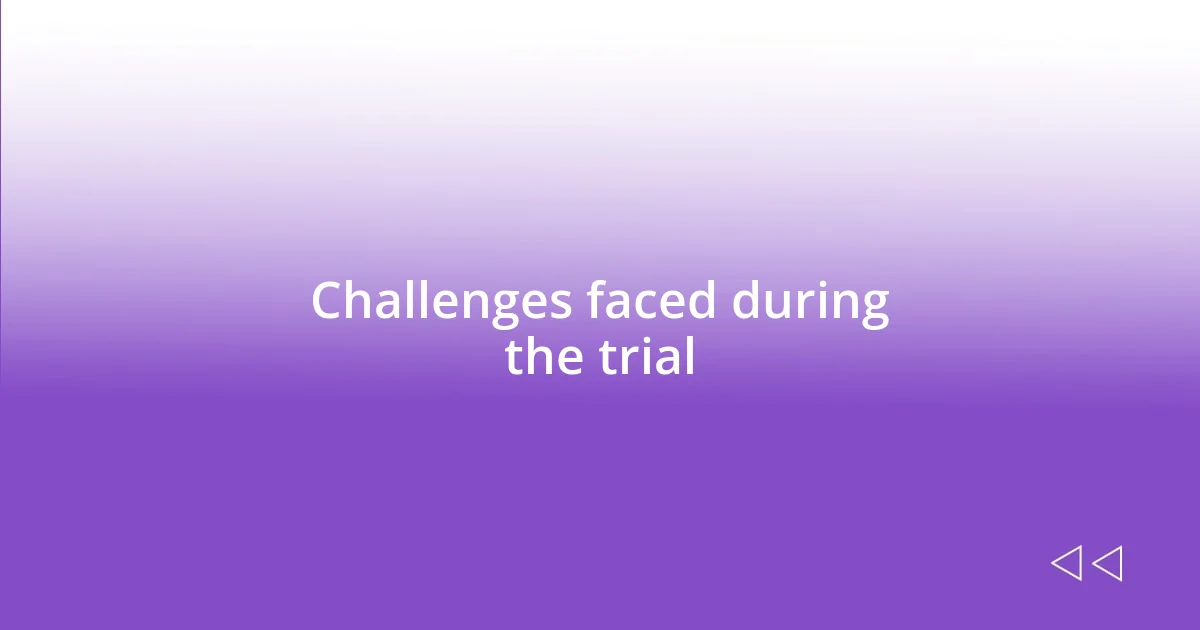
Challenges faced during the trial
Navigating the trial was far from smooth sailing. One of the most daunting challenges was the emotional rollercoaster that came with each new phase. I vividly remember receiving news about an unexpected side effect that not only rattled my sense of safety but also made me question my participation. It left me wondering: was this truly worth the risk? Balancing hope with fear became a constant struggle.
Another hurdle loomed large—communication gaps. I recall one instance where I felt completely out of the loop after a significant meeting. The researchers were discussing results, but it seemed like a foreign language to me. The lack of transparent updates made me feel isolated, as if I was just a number rather than a valued participant. Isn’t effective communication vital in fostering trust and collaboration?
As I met other participants, I quickly learned that we shared similar frustrations. We bonded over our missed expectations—many of us felt overwhelmed by the weight of data collection and the stress of routine check-ups. Those candid conversations reminded me just how crucial community support is during these trials. It helped transform our individual burdens into shared experiences, highlighting the importance of connection and empathy in navigating this challenging journey.
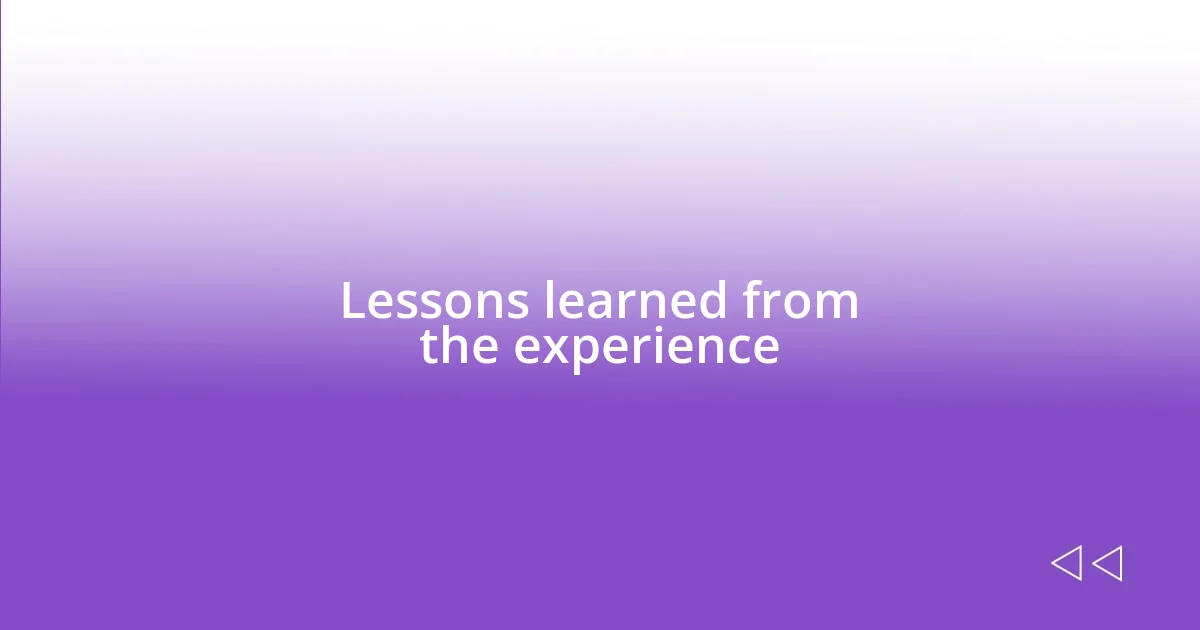
Lessons learned from the experience
Looking back on my journey through the trial, I learned that resilience is not just about enduring; it’s about adapting and responding to setbacks. One particularly tough day stands out when I felt utterly defeated by the latest results. I vividly remember sitting alone, questioning whether I had made the right decision to participate. Yet, that moment of vulnerability taught me the value of self-compassion. It made me realize that it’s perfectly okay to feel discouraged; it’s part of the human experience.
I discovered the importance of effective communication from both sides—participants and researchers alike. I often reflected on how much smoother the journey could have been if there had been open and continuous updates. One meeting left me bewildered, feeling more like a bystander. Why should anyone feel that way in an environment aimed at healing? This experience strengthened my belief that transparency fosters trust and engagement, reminding me that we’re all in this together.
Above all, I learned that trials are not just about results—they’re about the relationships built along the way. I still cherish the conversations with fellow participants that offered solace during those tough moments. We shared our experiences, fears, and hopes, and it was in those exchanges that I found genuine empowerment. Had I known how important this community would be, I would have reached out sooner. It highlighted for me that through shared struggles, we could find strength and meaning, even in the face of disappointment.
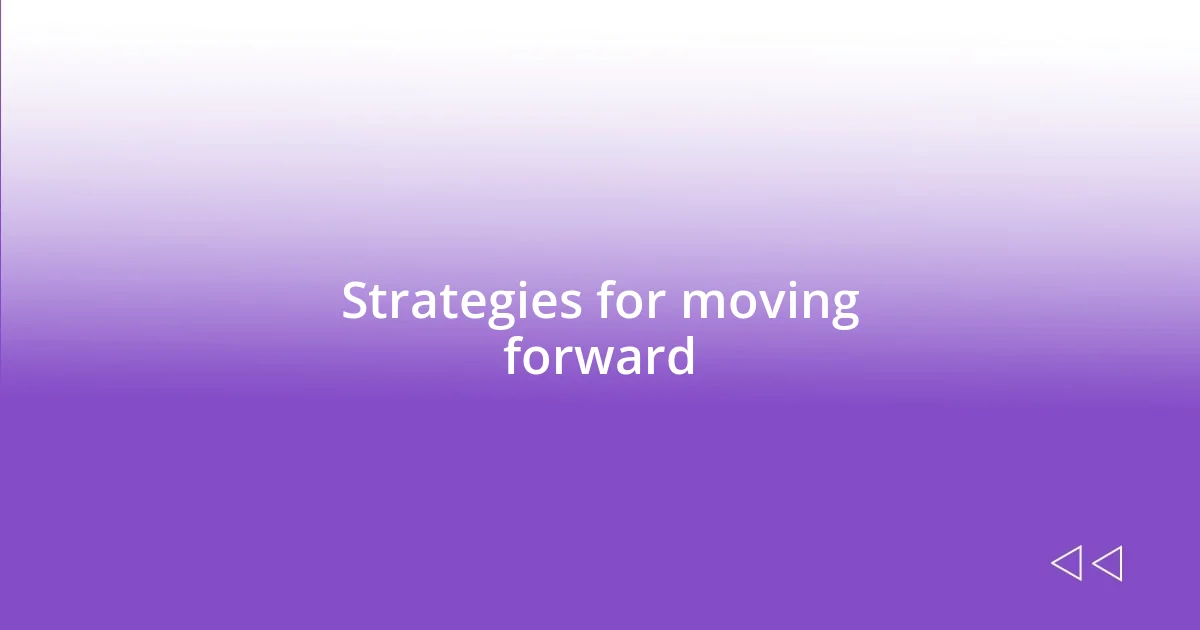
Strategies for moving forward
Embracing change is essential after a setback like a failed trial. I recall a moment when I decided to switch my focus from what went wrong to what I could learn. I started keeping a journal to track my feelings and insights. It was surprising how much clarity emerged from putting pen to paper. Have you ever experienced the liberating power of journaling? It helped me identify patterns in my thoughts and develop a plan for my next steps.
Reassessing my goals was another vital strategy. One evening, after a long day wrestling with disappointment, I asked myself: what do I truly want from this experience? This reflection led me to set smaller, more achievable milestones, sparking a renewed sense of purpose. It’s funny how breaking down a daunting journey into bite-sized pieces can create a more manageable path forward. Engaging in this process re-energized my commitment to being part of the community and still seeking opportunities for growth.
Building connections became a cornerstone of my recovery process. I reached out to others who had faced similar challenges, sharing both our frustrations and triumphs. Those conversations blossomed into a support network that provided comfort and motivation. It’s incredible how vulnerability can lead to deep connections, right? By focusing on shared experiences, I discovered that moving forward isn’t done in isolation—it flourishes in collaboration and empathy.
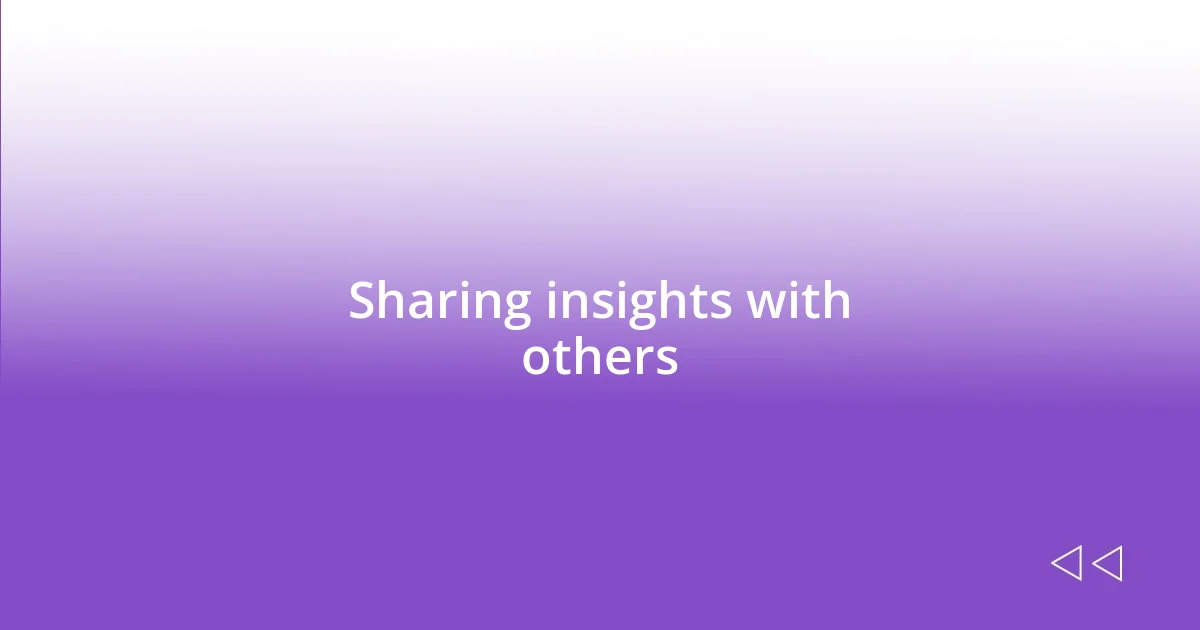
Sharing insights with others
While reflecting on my experiences, I found that sharing insights with others can act as a powerful catalyst for personal growth. I remember sitting in a small café, discussing my journey with a friend who was going through her own trial. Our conversation flowed freely, and suddenly, I realized that what felt like my burden transformed into a shared story. Have you ever experienced that moment when connecting with someone else shines a light on your own challenges?
I also discovered that vulnerability plays a crucial role in these conversations. During a group meeting, I hesitantly shared my thoughts on failure and disappointment. That moment of honesty resulted in others opening up about their struggles as well. It felt liberating to strip away the façade of perfection and embrace our shared humanity. I wonder, doesn’t it feel good to know you’re not alone in your experiences?
Furthermore, actively listening to others is just as important as sharing my own insights. In one poignant discussion with a fellow participant, she shared how fear of judgment had stifled her willingness to connect. This made me reflect on my own hesitations; I realized how easily we could build a bridge through empathy. As I listened, I felt a responsibility not just to share my story but to be present for others. Isn’t that the essence of community? It’s in those moments of empathy that we cultivate a supportive environment where insights can flourish.



